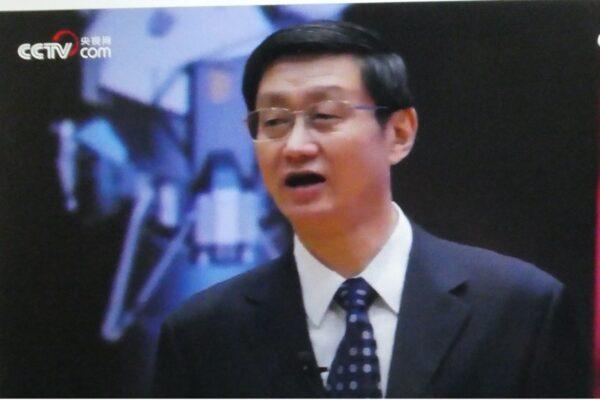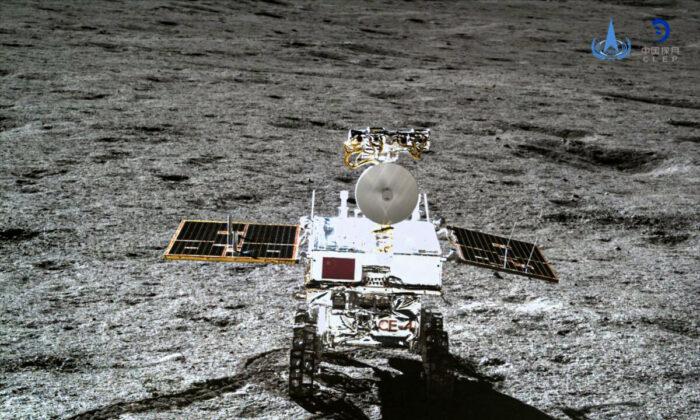The Chinese Communist Party (CCP) does not broadcast its ambitions to achieve hegemony in space in order to enforce its ambitions for hegemony on Earth. Still, it has turned the chairman and Party secretary of its leading space contractor, the China Aerospace Science and Technology Corporation (CASC), into a major spokesman for gradually revealing the Party’s imperial ambitions in space.
CASC builds tactical and intercontinental ballistic missiles (ICBMs) and many space launch vehicles (SLVs). It is the leading Chinese company for building rockets and landers to support China’s goal of putting people on the moon by 2030 or earlier.
Also, by giving political prominence to CASC’s chairman, the CCP is continuing its longstanding practice of lionizing key leaders in science and technology as servants of the Party dictatorship and its hegemonic ambitions.
In the January 2016 issue of the important CCP journal Qiushi (Seeking Truth), former CASC Chairman Lei Fanpei exhorted his colleagues, “To adhere to the path of development of civil-military integration, in the future demonstration project for deep space exploration, manned moon landing, heavy launch vehicle, and other major projects.”
Civil-military integration being a major CCP national policy to ensure the civilian sector does all it can to benefit the military, this was a rare admission from a top Chinese space official that China’s manned moon program would also be designed to benefit the CCP’s People’s Liberation Army (PLA) or to put weapons on the moon.
Since 2018, the CASC chairman has been Wu Yansheng, a now 59-year-old Ph.D. engineer whose loyalty to the Party and the building of its power has been an essential requirement for his rise to chairman.
On Dec. 2, 2020, the Sina Finance website reported Wu telling the China Entrepreneur Annual Conference, “China’s aerospace mission is to build a powerful aerospace country, support the construction of a world-class military, and build a world-class aerospace enterprise group.”
When Chinese officials speak of building a “world-class military,” they usually mean a military power that is dominant globally.
More recently, on Dec. 15, 2022, Wu gave a major presentation on China’s state television, in which he stated that China’s goal was “to rank among the top aerospace powers of the world by 2030 … to become a world aerospace power by 2045.”
This means that China’s goal is to become the world’s dominant space power by 2045 as an adjunct to the CCP’s goal of becoming the political-military-economic hegemon on Earth by 2049.
Wu also affirmed previous reports of China’s manned moon ambitions, that China would start testing its first man-rated 25-tons to the moon space launcher, now called the Long March-5G, in 2027, and will begin testing its 50-tons to the moon Long March-9 in 2030.
Wu revealed that China would also build a space “internet” for the moon consisting of lunar satellites that combine communication, surveillance, and navigation functions to support unmanned and manned activities on the moon.
Among its many visual accompaniments, Wu’s televised speech provided the latest depiction of China’s single-stage moon lander, a concept first revealed by other Chinese space officials in 2018.
However, the Chinese state television presentation deliberately tried to conceal images showing this moon lander will use a large propulsion stage, similar to the Soviet-era Bloc-D propulsion stage, designed to take its single-stage LK lander close to the moon before crashing to the surface.

This confirms that if China employs this single-stage moon lander concept, its propulsion stage would then “bomb” the moon’s surface. This could become a significant hazard as the moon’s south pole becomes crowded with the U.S. and other manned and unmanned settlements.
Much of Wu’s speech reiterated that China’s aerospace sector must follow the leadership of the Chinese Communist Party, with CCP Chairman Xi Jinping at the core, and that the space sector would strive to fulfill CCP goals to be daring, secure the “first move,” and to constantly stress “innovation” in space technology.
One such innovation mentioned by Wu was that China would build a “4S Shop” in space that would repair, replace, upgrade, and build spacecraft in space, a seeming effort to exceed the current “paradigm” of building reusable spacecraft on Earth, now dominated by the U.S. SpaceX Corporation.
Wu’s presentation also stressed the U.S. challenge to China’s space ambitions, including “restarting great power competition” and how the “Wolf Amendment” has barred China from the International Space Station.
Wu mentioned Washington’s more recent blacklisting of Chinese space companies and accused the United States of trying to dominate moon resources and take useful orbits and locations.
He also stressed the need to build a system of “space law” and “space environmental governance,” an indication that China will formulate and seek support for its own set of rules, having already rejected the U.S.-sponsored Artemis Accords for behavior on the moon.
The danger is that the Chinese regime will not offer fair rules, but use “lawfare” to isolate and preemptively constrain Western powers on the moon and beyond, and even use such laws to justify Chinese military operations on the moon and beyond.
A kind of response to Wu’s speech came from National Aeronautics and Space Administration (NASA) Administrator Bill Nelson, published in a Jan. 1 report in Politico, in which he stressed the space threats from China.
Nelson told Politico regarding China: “It is a fact: we’re in a space race. ... And it is true that we better watch out that they don’t get to a place on the moon, under the guise of scientific research ... [in which they say]: ‘Keep out, we’re here, this is our territory.’”
In addition, Nelson cited the Chinese regime’s record of territorial imperialism in the South China Sea as a preview of its behavior on the moon, saying: “If you doubt that, look at what they did with the Spratly Islands.”
Of course, one should not expect China’s space spokesmen like CASC’s Wu Yansheng to respond to concerns from the United States, or other countries, that the regime’s aggression in the South China Sea, or against Taiwan, will be used to justify its placement of weapons on the moon or its conduct of combat operations on the moon.
Chinese journals have already proposed placing lasers on the moon to conduct “scientific” surveillance of the Earth’s atmosphere. But given the all-encompassing requirements of China’s “civil-military integration” policies, one should expect that Chinese moon garrisons may include more powerful laser weapons capable of damaging U.S. deep space early warning satellites, which are essential for deterring Chinese and Russian nuclear aggression.
It is critical, irrespective of any future Chinese-led wars on Earth, that the United States sustain its ability to work with its allies and partners under the Artemis Accords to build a presence on the moon that helps to deter Chinese aggression.
This should include, as NASA’s Nelson is doing, timely and recurrent explanations of the dangers posed by China’s ambitions to control the Earth-moon system and deep space, and to eventually deny the ability of the democracies to benefit from the growing space economy.
In 2017, a year before Wu became its chairman, CASC issued a “road map” of goals that would enable China to dominate the space economy, including reusable large SLVs, nuclear-powered space shuttles to access the moon and Mars, large space-based solar energy satellites, and deep space mining.






Friends Read Free